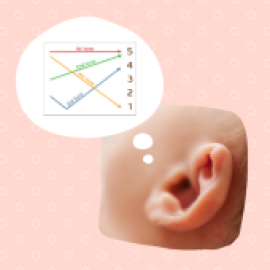If you have a child between the ages of 4-6 months, 9-11 months, or 16-18 months, you can have them participate in this fun study! You can schedule your appointment below. The study itself involves either one Zoom appointment with one of our researchers, OR one visit to the lab and takes no more than 30 minutes in total. We will ask you to seat in front of your computer screen with your child on your lap and we will show them some interesting objects paired with some fun words pronounced in different tones.
Our lab regularly collaborates with other labs across the world to enhance replication and best practices in the field of developmental psychology research. Currently, we are one of many labs contributing towards the investigation of infants’ ability to discriminate lexical tones as a function of their native language, age, and language experience, as well as tone properties.
In English, changes in pitch help to express different emotions, mark questions and emphasize the important parts of sentences. But pitch changes in tonal languages, such as Mandarin Chinese, can change the meaning of a word. For example, in Mandarin, the syllable ‘ma’ produced with a level pitch contour means “mother” and the same syllable produced with a low dipping contour means “horse”. The aim of this experiment is to assess the developmental trajectory of native and non-native perception of tone contrasts. Employing a similar experimental paradigm, 13 laboratories from around the world (Asia-Pacific, Europe, and North America) are combining efforts to better understand the developmental trajectory of lexical tone perception.
Call us at (865) 974-0514 or email us at infantlanguagelab@utk.edu to schedule an appointment!
